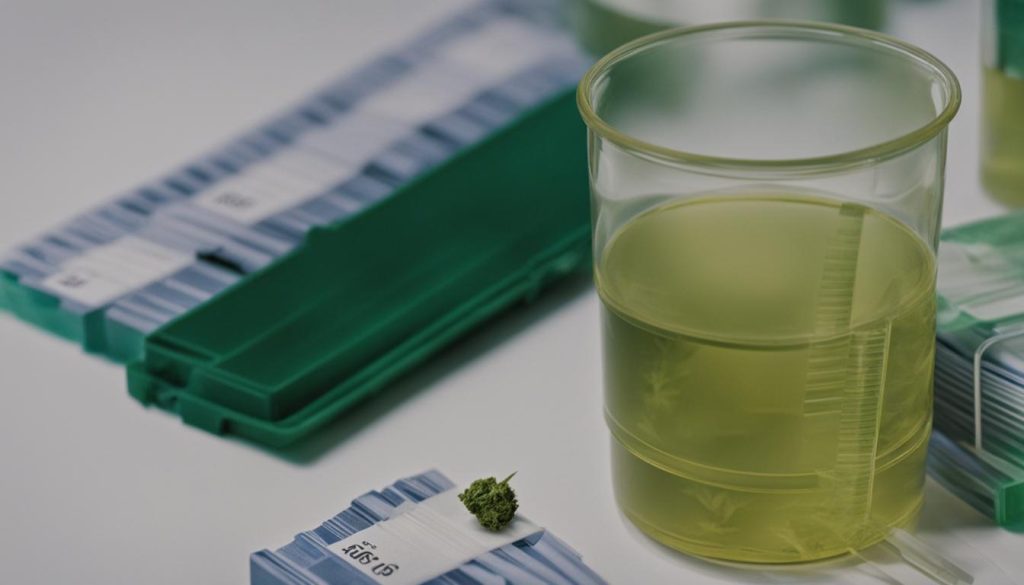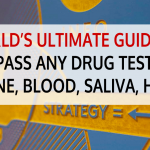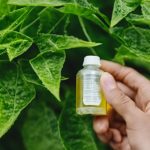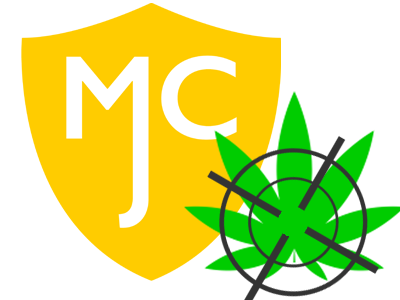
Passing a urine drug test for cannabis can be a challenging task. Drug testing facilities often use urine sample analysis to detect the presence of THC, the active compound in marijuana. These lab tests can determine whether an individual has used cannabis recently, posing potential consequences for employment or other legal matters. In this article, we will explore strategies to help you pass a urine drug test for cannabis and navigate this process successfully.
Key Takeaways:
- Urine drug tests can detect marijuana for different lengths of time based on frequency of use.
- Diluting urine by increasing fluid intake and using diuretics may help in passing a drug test.
- Tampering with the sample or using detox products may not guarantee accurate results.
- Understanding the different types of drug tests and their detection windows is crucial.
- Legal implications and consequences should be considered when preparing for a drug test.
Understanding Drug Tests
Drug tests are a common method for screening individuals for the presence of drugs in their system. These tests are used for various purposes, including pre-employment screening, monitoring medical conditions, and ensuring compliance with legal requirements. There are several types of drug tests, each with its own benefits and limitations.
The most commonly used drug tests include urine tests, hair tests, saliva tests, and blood tests. Urine tests are the most cost-effective and widely available option, detecting drug use within a few days of consumption. Hair tests have a longer detection window, capable of detecting drug use for up to 30 days or longer. Saliva tests are convenient and provide real-time results, detecting drug use within the past 24-48 hours. Blood tests, although less common, can indicate recent drug use within the past 24-48 hours.
Understanding the different types of drug tests and their respective detection windows is crucial for individuals who may be facing a drug test. By knowing which type of test may be administered, individuals can better prepare themselves and take the necessary steps to ensure accurate results.
| Drug Test Type | Detection Window | Method | Pros | Cons |
|---|---|---|---|---|
| Urine Test | Few days | Collecting urine sample | Cost-effective, widely available | Shorter detection window |
| Hair Test | Up to 30 days or longer | Collecting hair sample | Longer detection window | Higher cost, invasive collection process |
| Saliva Test | 24-48 hours | Collecting saliva sample | Convenient, real-time results | Short detection window |
| Blood Test | 24-48 hours | Collecting blood sample | Accurate for recent drug use | Invasive, less common |
Understanding the different types of drug tests and their respective detection windows is crucial for individuals who may be facing a drug test. By knowing which type of test may be administered, individuals can better prepare themselves and take the necessary steps to ensure accurate results.
Best Products To Help You Pass Drug Tests
When it comes to passing a drug test, there are several products available that can help increase your chances of success. These products are specifically designed to assist individuals in detoxifying their system and minimizing the presence of drugs in their body. Here are some of the best products to consider:
- Urine Kits: These kits allow you to test yourself before the actual drug test, giving you an idea of whether you’ll pass or not. They are capable of detecting a wide range of drugs, including cannabis.
- Detox Mouthwash: This product is designed to temporarily neutralize substances in the saliva, making it difficult for the drug test to detect any drugs present.
- Detox Gums: Similar to detox mouthwash, detox gum provides a quick solution for masking drug use in the saliva. It can be easily chewed before the test to help minimize the chances of detection.
- Detox Drinks: These specially formulated drinks are designed to reduce toxin levels in the urine for a certain period of time. They work by diluting the urine and flushing out any traces of drugs, making it more likely to pass the drug test.
- Cleansing Shampoos: Used specifically for hair drug tests, cleansing shampoos help remove drug metabolites and toxins from the hair. They work by deep-cleaning the hair shaft, ensuring that any traces of drugs are washed away.
It’s important to choose the right product based on the type of drug test you’ll be taking and your individual needs. Remember to follow the instructions carefully and give yourself enough time to prepare for the test. While these products can increase your chances of passing a drug test, it’s important to note that they may not guarantee accurate results. Always use them with caution and consider seeking professional advice if needed.
Table: Comparison of the Best Products for Passing Drug Tests
| Product | Type | Usage |
|---|---|---|
| Urine Kits | Testing | Self-testing before the drug test |
| Detox Mouthwash | Saliva Test | Rinse mouth before the test |
| Detox Gums | Saliva Test | Chew gum before the test |
| Detox Drinks | Urinalysis | Drink before the test |
| Cleansing Shampoos | Hair Test | Use during hair washing |
By using these products in conjunction with other strategies, such as abstaining from drug use and maintaining a healthy lifestyle, you can increase your chances of passing a drug test successfully. However, it’s important to note that individual results may vary, and it’s always best to consult with professionals if you have any concerns or questions.

Types of Drug Tests
When it comes to drug testing, there are several different types of tests that can be used to detect the presence of drugs in the body. These tests include saliva tests, blood tests, urine tests, and hair tests. Each test has its own advantages and considerations, and understanding the differences between them can be crucial in preparing for a drug test.
Saliva Tests
Saliva tests, also known as oral fluid tests, are non-invasive and relatively easy to administer. They involve collecting a saliva sample from the mouth and testing it for the presence of drugs. Saliva tests are commonly used to detect recent drug use within the last 24 to 48 hours. They are particularly effective for detecting the use of drugs such as marijuana, cocaine, amphetamines, and opioids.
Blood Tests
Blood tests are more invasive and require a blood sample to be taken from the individual. These tests are often used in medical settings and can provide more accurate and detailed information about drug use. Blood tests can detect drugs in the system within the last 24 to 48 hours, making them useful for detecting recent drug use or drug overdoses. However, blood tests are less commonly used for routine drug testing due to their invasive nature and higher costs.
Urine Tests
Urine tests, also known as urinalysis, are the most common type of drug test. They involve collecting a urine sample from the individual and testing it for the presence of drugs or drug metabolites. Urine tests are relatively easy to administer and can detect a wide range of drugs. They have a detection window of a few days, making them suitable for detecting recent drug use. Urine tests are commonly used in workplaces, schools, and other settings that require drug testing.
Hair Tests
Hair tests involve collecting a hair sample from the individual and testing it for the presence of drugs. Hair tests have a longer detection window compared to other types of drug tests and can detect drug use for up to 90 days or longer. This makes them particularly useful for detecting chronic drug use. However, hair tests are less commonly used for routine drug testing due to their higher costs and the time it takes for drugs to appear in the hair shaft.
| Type of Drug Test | Detection Window | Advantages | Considerations |
|---|---|---|---|
| Saliva Test | Within the last 24 to 48 hours | Non-invasive, easy to administer | Less suitable for detecting long-term drug use |
| Blood Test | Within the last 24 to 48 hours | Accurate and detailed information | Invasive and higher costs |
| Urine Test | A few days | Most common type of drug test, wide range of drugs detected | Detection window limited to a few days |
| Hair Test | Up to 90 days or longer | Detects chronic drug use | Higher costs and longer time for drugs to appear in hair |
How Long Can Drugs Be Detected Through Tests?
When it comes to drug testing, one of the key factors to consider is the detection window – the length of time drugs can be detected in the body after use. The detection window varies depending on the type of drug test and the specific drug being used. For a urine drug test, drugs can typically be detected for up to 72 hours. However, it’s important to note that certain drugs, like marijuana, can be detected for longer periods of time in heavy, chronic users. Hair follicle tests, on the other hand, have a longer detection window and can show drug usage for up to 90 days or even longer.
It’s also important to consider various factors that can affect the detection window. The frequency and dosage of drug use, individual health, diet, and activity levels can all impact how long drugs stay in the system. Chronic or habitual drug users may take longer to clear drugs from their body compared to occasional users.
Understanding the detection window is crucial for individuals who need to prepare for a drug test. By knowing how long a drug can be detected, individuals can take the necessary steps to ensure they pass the test, such as abstaining from drug use leading up to the test and possibly using detox products specifically designed to help eliminate drugs from the body.
| Drug Test Type | Detection Window |
|---|---|
| Urine Drug Test | Up to 72 hours |
| Hair Follicle Test | Up to 90 days or longer |
It’s important to note that the detection windows mentioned above are general guidelines and can vary depending on individual circumstances. Factors such as metabolism, body fat percentage, and overall health can influence the length of time drugs can be detected in the body. For accurate information regarding the detection window for specific drugs and tests, it is always recommended to consult with a healthcare professional or a trusted source.
How to Pass a Drug Test On Short Notice?
When faced with a drug test on short notice, it’s important to take immediate action to increase your chances of passing. We understand that the stakes are high, and a positive result can have serious consequences. That’s why we’ve compiled a list of strategies and precautions to help you prepare adequately and navigate the testing process.
Get Informed
Start by gathering information about the specific drug test you will be taking. Different tests have varying requirements and detection windows. Understanding the test’s parameters will allow you to tailor your preparations accordingly. Familiarize yourself with the type of drug test, such as urine, hair, saliva, or blood, and determine the typical detection time for the substances you have used.
Consider Detox Products and Cleansing Programs
Detox products and cleansing programs can be effective tools in eliminating drugs from your system before a test. There are various options available, including detox drinks, detox mouthwash, detox gums, and cleansing shampoos. Choose a product that is suitable for the type of drug test you will be taking and follow the instructions carefully for the best results.
Keep in mind that these products are not guaranteed to work for everyone, and their effectiveness may vary based on individual factors. However, incorporating detox products into your preparation routine can increase your chances of passing a drug test on short notice.
Maintain a Healthy Lifestyle
In addition to using detox products, it’s essential to adopt a healthy lifestyle leading up to the test. A balanced diet, regular exercise, and staying hydrated can help naturally flush toxins from your body. Avoiding drug use during this period is crucial to prevent any new substances from entering your system. By taking care of your overall well-being, you can support your body’s natural detoxification processes and improve your chances of passing the drug test.

Preparing for a drug test on short notice can be a stressful experience. However, by getting informed, considering detox products and cleansing programs, and maintaining a healthy lifestyle, you can increase your chances of passing the test. Remember to always follow the guidelines and regulations set forth in your jurisdiction and be aware of any legal implications. With careful preparation and adherence to best practices, you can navigate the process successfully and achieve the desired outcome.
Legal Considerations
When it comes to drug tests, there are important legal implications that individuals need to be aware of, especially in employment situations. Failing a drug test can have severe consequences, including job loss, loss of benefits, damage to reputation, fines, and even potential criminal charges. Therefore, it’s crucial to understand the potential legal ramifications and take the necessary steps to pass a drug test.
In employment settings, drug tests are often conducted to ensure a safe and productive work environment. Employers have the right to enforce drug-free policies and make hiring or firing decisions based on drug test results. If an employee fails a drug test, it can result in termination or the denial of employment. This can have a long-lasting impact on an individual’s career prospects and future opportunities.
“Failing a drug test can have severe consequences, including job loss, loss of benefits, damage to reputation, fines, and even potential criminal charges.”
It’s also essential to note that the consequences of failing a drug test can extend beyond employment. Some professions, such as law enforcement, healthcare, or transportation, have strict regulations regarding drug use. Failing a drug test in these fields can lead to the revocation of licenses or certifications, making it difficult to continue working in the chosen profession.
While the consequences of failing a drug test are significant, it’s important to remember that there may be legal recourse in certain situations. If a drug test is conducted unfairly or the testing process was not followed properly, individuals may have grounds for legal action. It’s crucial to familiarize yourself with local regulations and labor laws regarding drug testing to protect your rights and explore potential legal avenues if needed.
Ultimately, understanding the legal implications of drug tests is essential for individuals who may be subject to testing. By being aware of the potential consequences and taking the necessary precautions, individuals can navigate the process of drug testing more effectively and protect their rights in these situations.
Tips and Precautions
When preparing for a drug test, it’s essential to take certain precautions to ensure accurate and valid results. Here are some important tips to keep in mind:
- Avoid medications and foods that may lead to false positives: Some over-the-counter medications, such as cold and allergy medications, can cause false positive results in drug tests. Additionally, certain foods like poppy seeds may also produce false positives for opioids.
- Stay well-hydrated, but avoid excessive water consumption: While drinking plenty of water may help dilute urine and potentially decrease the concentration of drugs, it is crucial not to overdo it. Drinking excessive amounts of water can raise suspicion and may lead to an invalid test due to sample dilution.
- Be aware of potential false negatives: False negatives occur when a drug test fails to detect the presence of drugs even though they have been used. Factors such as the sensitivity of the test, the timing of drug use, and individual metabolism can influence the likelihood of false negatives. It’s important to understand the limitations of drug tests and that negative results are not always definitive.
- Avoid cheating or tampering with the sample: Cheating or tampering with the urine sample by using adulterants or synthetic urine can lead to severe consequences, including legal actions and potential employment termination. Laboratories have become increasingly sophisticated in detecting sample tampering, so it is not a reliable strategy.
Remember, the goal is to navigate the drug testing process ethically and effectively. By following these tips and taking necessary precautions, you can increase your chances of passing a drug test while maintaining your integrity.

Conclusion
In conclusion, passing a urine drug test for cannabis can be a challenging process. However, with the right strategies and preparations, it is possible to increase the chances of success. It is essential to understand the different types of drug tests and their specific detection windows, as this knowledge will inform your approach to preparation. Choosing the appropriate detox products and maintaining a healthy lifestyle are also key factors in achieving favorable results.
Additionally, it is crucial to be aware of any legal implications surrounding drug testing in your jurisdiction. Failing a drug test can have severe consequences, such as job loss, reputation damage, and potential legal actions. It is vital to understand the guidelines and regulations in your area to protect your rights and make informed decisions.
By following the strategies and precautions outlined in this article, individuals can navigate the drug testing process more effectively and increase their chances of passing a urine drug test for cannabis. Remember to stay informed, take necessary precautions, and make choices that align with your personal circumstances and goals.
FAQ
How long can cannabis be detected in a urine drug test?
The detection window for cannabis in a urine drug test varies based on the frequency of use. Occasional users may be detected 1-5 days after use, regular users 1-3 weeks, and heavy daily users 4-6 weeks.
Do urine tests measure impairment or just detect the presence of drugs?
Urine tests for drugs do not measure impairment but rather detect nonactive metabolites of THC.
Can excuses like passive smoking be used to challenge positive drug test results?
Excuses like passive smoking are generally not accepted unless in extreme circumstances.
What are some common strategies for diluting urine to pass a drug test?
Common strategies include increasing fluid intake, stimulating urination with diuretics, and using detox products.
What are the most common types of drug tests?
The most common types of drug tests include urine tests, hair tests, saliva tests, and blood tests.
How long can drugs be detected in hair tests?
Hair tests can detect drug use for up to 30 days or longer, depending on the specific drug.
How do detox drinks work for passing a drug test?
Detox drinks are designed to minimize toxin levels in the urine for a certain period of time, increasing the chances of passing a drug test.
What is the detection window for drugs in saliva tests?
Saliva tests can detect drug use within the last 24-48 hours.
How long do drugs remain detectable in blood tests?
Blood tests can indicate recent drug use within the last 24-48 hours.
How can I increase my chances of passing a drug test on short notice?
Steps to increase the chances of passing a drug test on short notice include using detox products, maintaining a balanced diet, staying hydrated, and avoiding drug use leading up to the test.
What are the consequences of failing a drug test?
Failing a drug test can result in job loss, loss of benefits, damage to reputation, fines, and potential criminal charges.
What precautions should I take when preparing for a drug test?
Precautions when preparing for a drug test include being aware of false positives and negatives, avoiding cheating or tampering with the sample, and choosing reliable methods to minimize risks and ensure accurate results.















